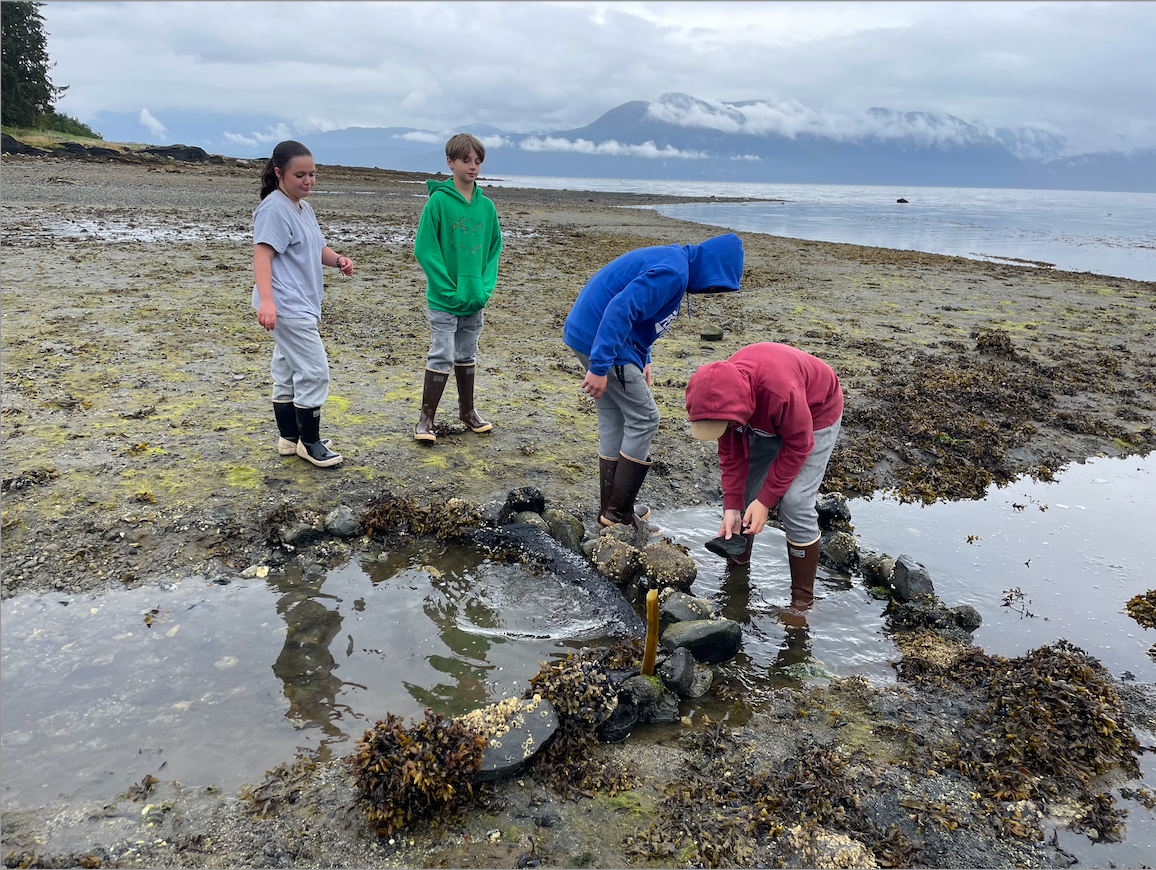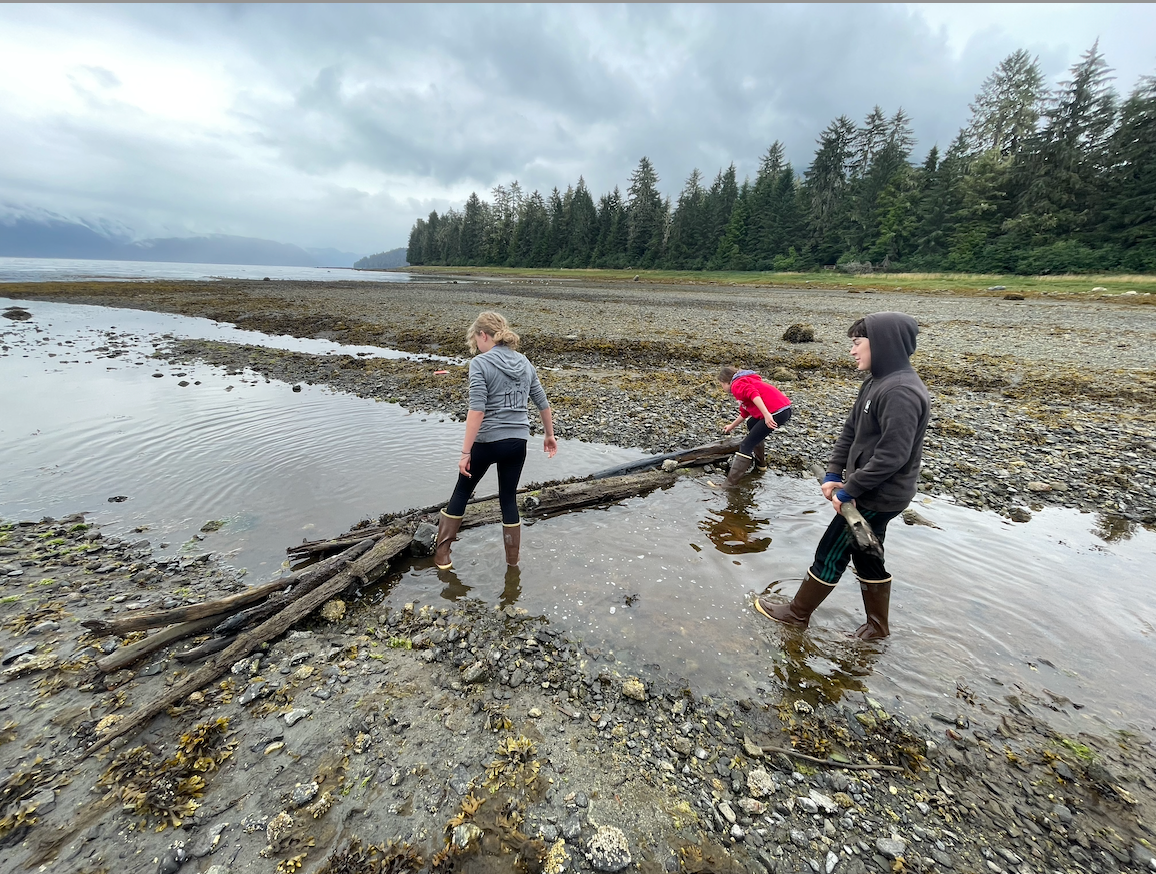
(Photo by Olivia Schmidt/KFSK)
As school begins in Petersburg, some students got an early start on their learning during the last week of summer break. Middle schoolers participated in a hands-on science camp, where they explored local ecosystems and connected with the natural world.
The camp, organized by Alaska Sea Grant’s Sunny Rice, brought 12 middle school students together to engage in field biology, learn about Southeast Alaska’s environment, and consider potential science-related careers.
At Sandy Beach, students built fish traps modeled after those used by the Tlingit people for centuries. The traps were designed to catch fish with the incoming tide, but instead of eating their catch, the students only documented them.
“We went out to low tide and drew some of the creatures we found,” said Adelee Luppino, one of the campers. “I really love science, and I wanted to learn more about the tide and animals.”
Rice, who envisioned the camp as a way to get kids excited about biology, finds joy in watching students make connections with nature.
“I love seeing them get excited about the natural world, because I was one of those kids who got excited about the natural world,” Rice said. “When they come up and show you something that they think is extra cool, or they make a connection that you’ve been trying to make all week long, that’s what excites me.”
Rice also hopes to inspire students to consider careers in science. Throughout the week, students interacted with local wildlife experts, biologists, and ecologists.
“Kids at the middle school age, it’s a really crucial age to introduce them to careers in science – or any kind of careers,” Rice said. “So part of what we do at camp every year is introduce them to people that have jobs in Petersburg that are related to science.”
This year, the camp also incorporated Indigenous knowledge, with the help of cultural liaison YaKunda.ein Avery Herrman-Sakamoto, funded by a grant from the Petersburg Community Foundation.
“I think it’s really important to teach students that Indigenous knowledge is science, and not to differentiate it [from] ‘Western science’,” Herrrman-Sakamoto said. “A lot of the time, adults really emphasize cultural knowledge is different, but it’s very much the same thing, just with different ways of expressing it.”
According to Herrman-Sakamoto, practical applications like building fish traps help students better understand natural processes and develop critical thinking skills.
“The cool part about this camp is that it makes experiences like that more accessible for students, and it teaches them life skills, like how to identify a plant,” she said. “It makes them think differently and gives them a new perspective.”
“The really cool part about this camp is, it makes experiences like that more accessible for students, as well as teaching them life skills,” she said. “ [Like] how to actually look something up, and how to identify a plant – it kind of just makes them think about things differently and gives them a different perspective.”
Camper Kaylee Kvasnikoff said she wants to see more outdoor learning incorporated into the school year.
“It makes me think we need to do more field trips and go out more,” Kvasnikoff said. “We do a lot of classroom work, but not a lot of outdoor learning.”
Luppino agreed, adding, “I think visually, so whenever I see things, I understand it more. I feel like we should go out more.”
The week-long camp is open to all students entering sixth through eighth grade and concluded this year with a boat trip up the Stikine River. While the camp has always been free, Rice said the policy might change due to funding concerns.
“There are questions about whether the camp should remain free,” Rice said. “There have been debates about whether or not we should be providing things like a boat trip through a grant when some of the parents maybe could afford to do it. That’s honestly a stumbling block going forward with camp. ”
The camp’s free status has been particularly important for parents like Kari Peterson, a single mother and volunteer.
“If I had to pay, I wouldn’t be able to afford it,” Peterson said. “It meant a lot to me on a personal level that my son could participate. He needs this knowledge to move forward.”
Peterson noted that besides scientific learning, the camp also teaches kids about their local surroundings.
“I was surprised to see the hands go up of kids that had never been out to Three Lakes,” she said. “You live in Petersburg, and you’ve never been out to Three Lakes? And so that was interesting to hear when we came back, the kids saying, ‘Wow, that was fun!’ – from the same kids that have never been out there.”
As for their favorite activities, campers enjoyed a range of experiences, from learning about animal habitats to observing marine life.
“I think the coolest thing was learning how animals have their niches in the habitat,” camper Nate Olsen said. “They all work together and compete with each other.”
“I thought the starfish and the crabs were really cool, and I just really liked watching the animals in an environment,” Luppino said.
“The kids went swimming yesterday. That was really fun. I didn’t swim, but it was fun to watch and be there. It was nice and warm,” Kvasnikoff added.
For Herrman-Sakamoto, the best part of the camp was watching the kids experience and appreciate the same spaces she did as a child.
“Just seeing them create really fun and beautiful memories where I did growing up, in a very different way than I did, was impactful,” she said. “ And seeing them also connect the dots of what we’re talking about, and they’re like, ‘Oh, well actually like this organic matter is different than this’, I think it’s awesome. They have these tools now.”
As summer turns to fall, Herrman-Sakamoto and the other leaders hope that the memories and lessons from Petersburg’s Summer Science Camp will stay with these campers well into their future scientific endeavors.

(Photo by Olivia Schmidt/KFSK)











